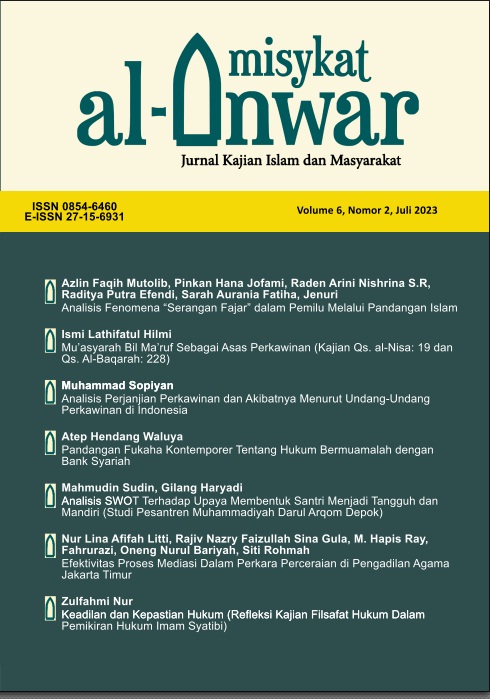Keadilan Dan Kepastian Hukum (Refleksi Kajian Filsafat Hukum Dalam Pemikiran Hukum Imam Syâtibî)
Main Article Content
Abstract
Article Details
All manuscripts published in the Misykat al-Anwar Journal of Islamic Studies and Society are entirely the property of the author, as for the entry and unpublished script of the journal, the copyright is wholly the property of the author.
All manuscripts published in the Misykat al-Anwar Journal of Islamic Studies and Society are open to the public by following the provisions of the CC-BY-NC-SA (Attribution Non Commercial Share Alike) platform where everyone is allowed and permitted to adapt, the results of the study with the provision should provide citation credit to the author (citation) not for commercial purposes, and one must make a similar provision to the results of his research.
---
Semua naskah yang diterbitkan dalam Misykat al-Anwar Jurnal Kajian Islam dan Masyarakat sepenuhnya menjadi hak milik penulis, adapun naskah yang masuk dan belum diterbitkan oleh jurnal, hak cipta sepenuhnya milik penulis.
Semua naskah yang diterbitkan dalam Misykat al-Anwar Jurnal Kajian Islam dan Masyarakat terbuka untuk umum (open access) dengan mengikuti ketentuan platform CC-BY-NC-SA (Attribution Non Commercial Share Alike) semua orang diperbolehkan untuk menyadur, merujuk dan mengadaptasi tulisan/hasil penelitian dengan ketentuan harus memberikan kredit rujukan kepada penulis (citation) bukan untuk kepentingan komersial, dan seseorang harus melakukan ketentuan yang serupa terhadap hasil penelitiannya.
References
Al-Ajfan, Muhammad Abu, Min Asar Fuqaha al-Andalus: Fatawa al-Imam asy-
Syatibi, Tunis: Matba‟ah al-Kawakib, 1985.
Alim, Yusuf Hamid, (1994M/1415H). al-Maqasid al-‘Ammah li al-Syari’ah al-
Islamiyah, Riyad: Dar al-„Alamiyah li al-Kutub al-Islami,
Hallaq, Wael B, (1997). A History of Islamic Legal Theory: an Introduction to sunni
ushul fiqh¸ Cambridge: Cambridge University Press
Hosein, Zainal Arifin, (2006). Pengujian Peraturan Perundang-Undangan Menurut
Konstitusi, Studi Tentang Perkembangan dan Pelaksanaannya Oleh Mahkamah Agung RI
Kurun Waktu 1970-2003. Universitas Indonesia
Ibn „Asyur, Muhammad Thahir, (1430H/2009 M). Maqasid al-Syari’ah al-Islamiyah.
Tunis: Dar al-Salam
Ibn Mukhtar, Muhammad Amin, (t.th). Muzakarah Ushul Fiqh. Beirut: Dar al-
Qalam.
Kamal, Zainun (1995) Kritik Ibn Taimiyah Terhadap Logika Aristoteles, Fakultas
Pasca Sarjana Institut Agama Islam Negeri Syarif Hidayatullah Jakarta: Disertasi tidak
diterbitkan.
Mas‟ud, Muhammad Khalid, (1989). Islamic Legal Philosophy: a Study of Abu Ishaq
al-Shatibi’s Life and Thought, Delhi: International Islamic Publisher
Moh. Mahfud MD, Perdebatan Hukum Tata Negara Paca Amandemen Konstitusi,
Jakarta: RajaGrafindo 2010
Mahendra, Yusril Ihza, (1996). Dinamika Tatanegara Indonesia Kompilasi Aktual
Masalah Konstitusi Dewan Pewakilan dan Sistm Kepartaian, Jakarta: Gema Insani Press,
Muslehudin, Muhammad, (1985).Philosophy of Islamic Law and The Orientalits,
Delhi: Markazi Maktaba Islami.
Muabezi, Zaherman Armandz, (2017). “Negara Berdasarkan Hukum, (Rechtsstaat)
Bukan Kekuasaan (Macthsstaat)”. dalam Jurnal Hukum dan Peradilan, Vol. 6, No.3.
November
al-Qaradawi, Yusuf . (1990). Madkhal li Dirasat al-syar’iyah al-Islamiyah, Kairo:
Maktabah Wahbah
Ridha, Muhammad Rasyid (t.t.h). dalam pengantar Kitab al-I’tisam, jilid 1 (Beirut:
Dar al-Fikr, tt.
Ridwan, Zulkarnain (2012) ,”Negara Hukum Indonesia Kebalikan
Nachtwachterstaat”. Fiat Justitia Jurnal Ilmu Hukum, Vol. 5. No.2
Rahardjo, Satjipto Mengajarkan Keteraturan Menemukan Ketidakteraturan, Pidato
Mengakhiri Jabatan Sebagai Guru Besar Tetap Pada Fakultas Hukum Universitas Diponegoro
Rahardjo, Sadjipto. (2009). Negara Hukum Yang Membahagiakan Rakyatnya,
Yogyakarta: Genta Phublising,
Rahardjo, Satjipto. (1982). Ilmu Hukum, Bandung: Alumni.
Shidarta.“Penegakan Hukum dalam Perspektif Budaya Hukum.” PPH Newsletter. No.
, September 2005
al-Syatibi, Abu Ishaq (t.th).al-Muwafawat fi Ushul al-Syari’ah, Beirut: Lubnan, Dar
al-Kutub al‟Alamiyah, Juz 1-4.
al-Syatibi, Abu Ishaq (t.th). al’I’tisham, (Beirut, Lubnan, Dar al-Kutub al‟Alamiyah
Utrecht, (1962). Pengantar Hukum Administrasi Negara Indonesia, Ichtiar,
Jakarta
„Ulwan, Muhammad Fahmi, al-Qiyam adh-Dharuriyah wa Maqasid at-Tasyri’ al-
Islami
Wijaya, Made Hendra, (2015). “Karakteristik Konsep Negara Hukum Indonesia”
Jurnal Advokasi, Vol. 5 No. 2
Watt, Montgomery (1977). A History of Islamic Spain, (Edinburg: University Press,
al-Zuhaily, Wahbah, (1986 M/1406 H). Usul al-Fiqh al-Islami, (Damaskus: Dar al-
Fikr, cet. ke-1„
Zahrah, Muhammad Abu, (t.t.). Ibn Taimiyah Hayatuh wa Asruh, wa Aruh wa
Fiqhuh, Mesir: Dar al-Fikr al-Arabi. , tt
Az-Zarqa, Mustafa Ahmad. dalam kata pengantara bukum Muhammad Abu Al-
Ajfan, Min Asar Fuqaha al-Andalus:Fatawa al-Imam asy-Syatibi
